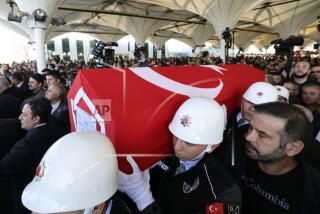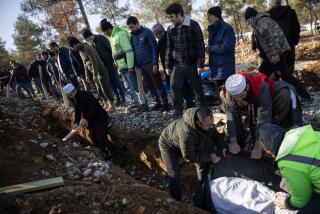Turkey Urges Kurdish Rebels to Surrender as It Continues Strikes
- Share via
ISTANBUL, Turkey — An elated Turkey paraded the long-hunted guerrilla leader before the cameras, showing the world a disheveled, middle-aged man standing between two blood-red Turkish flags.
For many Turks, the humiliating treatment of Abdullah Ocalan showed that his guerrilla movement is finished and that an end to the 15-year war in southeastern Turkey is in sight.
Prime Minister Bulent Ecevit renewed surrender appeals Saturday to Ocalan’s fighters, asking them to lay down their arms in exchange for clemency.
But the grinding poverty and alienation that helped spawn the Kurdistan Workers Party, or PKK, in the barren mountains of southeastern Turkey remain. Whether Turkey will fight those ills with the ferocity with which it has battled Kurdish insurgents is unclear.
Turkish warplanes and helicopters pounded several rebel hide-outs in northern Iraq on Saturday, the sixth day of cross-border strikes against the rebels, the Anatolian News Agency said.
The situation is unlikely to be resolved any time soon.
“The Kurdish problem . . . is a very deep problem for Turkey. The PKK is only the result,” said Turkish journalist Oral Calislar, who faces up to 4 1/2 years in prison for interviews with Ocalan that prosecutors say promoted Kurdish autonomy.
Ecevit said Friday that Turkey will increase spending on infrastructure in the southeastern Kurdish-dominated areas, by far Turkey’s poorest and most neglected.
“The back of the terrorist organization is broken, and the terrorist chief has been captured,” he said. “Now, it is time to speed up investments and development.”
The challenge is massive.
The road system in the south is primitive, and some Kurdish villages are cut off from the rest of the country for months in the winter snowfall.
Some areas lack running water and electricity.
The educational system is poor, and the language of instruction is Turkish, which many children speak only as a foreign language.
“I don’t think we will see the end of poverty in that area by the end of my lifetime,” said Michael Radu, an analyst at the Foreign Policy Research Institute in Philadelphia. “I hope this military triumph . . . does not translate into political blindness by saying that we finished with the PKK and the Kurdish issue has disappeared.”
For many Kurds in the region, emigration and cultural assimilation have been the answer to their plight. For decades, Kurds have been fleeing the southeast in search of a better education and jobs.
About 3 1/2 million Kurds, more than a quarter of the Kurdish population, fled their homes for cities in Turkey or Western Europe after fighting between the PKK and the army escalated in 1990.
Guerrilla bands are still hiding in the mountains, and the government has no plans to scale back the 220,000 soldiers and police stationed in the area.
While some analysts say the PKK will collapse, others fear that a leaderless, divided guerrilla group could be more dangerous.
More to Read
Sign up for Essential California
The most important California stories and recommendations in your inbox every morning.
You may occasionally receive promotional content from the Los Angeles Times.













